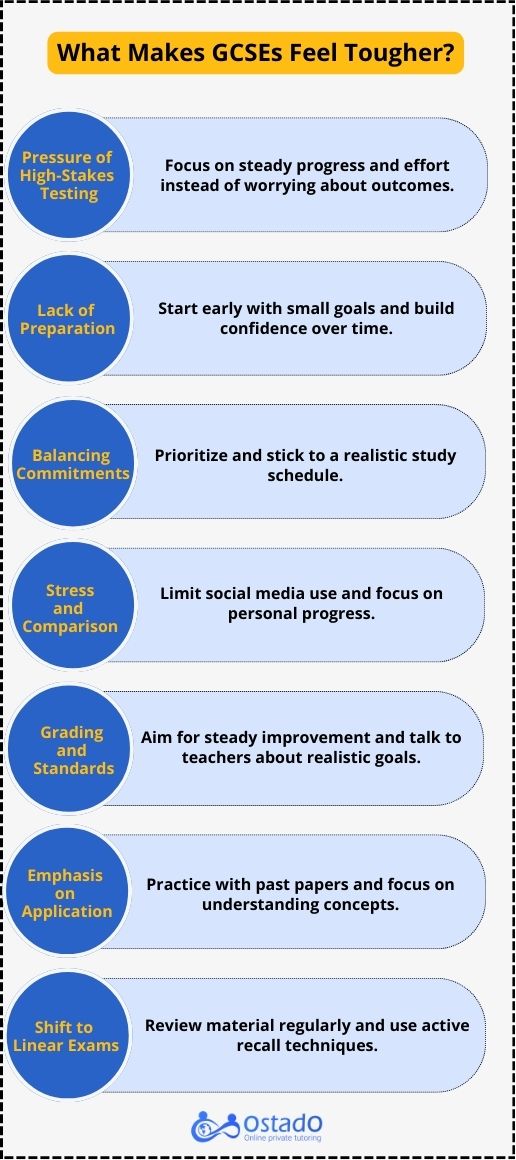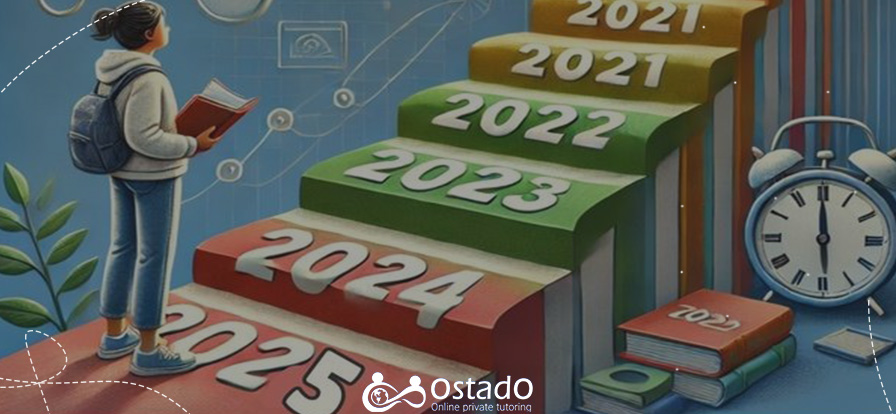Every year, there’s a buzz among students: “Are GCSEs getting harder?” If you’re in Year 11 or planning to retake your GCSEs, you might wonder if the examiners are raising the bar yet again. Maybe you’ve heard stories from older siblings or friends about “how much easier it was back then,” leaving you worried about what lies ahead.
But here’s the truth: while GCSEs do evolve to reflect modern education, they’re not designed to be impossible. With the right approach, preparation, and understanding of how exams are structured, you can tackle them confidently, no matter the year.
Are GCSEs Actually Harder? Examining the Evidence
Based on the changes that GCSE exams have undergone due to the 2015 reforms, we can say that getting higher grades requires more effort because you have to revise for preferably 8 to 10 subjects all at once.
However, on the plus side, you have access to many resources to prepare for the exams. For instance, you can now benefit from a plethora of GCSE revision guides such as books, podcasts, videos, interactive websites, and apps, while, in the past, students relied heavily on coursebooks and classroom materials.
In other words, older GCSEs relied heavily on memorisation, while newer ones focus more on understanding and applying knowledge. This shift can feel challenging, but it’s a fairer way to assess real-world skills.
Perceived Difficulty of GCSE Exams
The idea of “harder” GCSEs primarily originates from how students define exam complexity, which is relatively subjective. When a student says, “This 2023 paper was so much harder than previous ones,” does this mean that the exam board deliberately designed more complicated questions or that the student was underprepared?
It’s worth mentioning here that all exam boards in the UK must comply with the standards set by Ofqual, a regulatory body in charge of qualifications, examinations and assessments in the UK. This ensures that marking schemes for GCSE exams are fair and students have an equal chance to get higher grades.
Word of Advice:
If you’re planning to get admitted into top colleges and universities, getting high GCSE grades is the foundation stone. Therefore, it’s well worth it to get help from private GCSE tutors to receive personalised lessons and immediate feedback on subjects that are challenging for you.
Understanding How GCSEs Have Changed Over Time
GCSE examinations have been around since 1988, and they’ve inevitably undergone major changes over time. Based on what some older (in their 40s and 50s) exam takers say, the exams have gotten easier, and they had much time to spare when they answered all the questions.
However, a seasoned arts teacher wrote that GCSEs have become “more demanding and sophisticated than 30 years ago.”
We can’t reach a single answer to whether GCSEs are getting harder each year, but we can say they have advanced in that they have more distinguishing power and more reliable results. Let’s review two major changes in GCSE exams.
Change in Grading Scale
The grading scale in the UK used to define a test taker’s performance using alphabetical values ranging from A to F. The test taker must at least get a C to pass the exam. However, in the new grading scale, the test taker’s performance is indicated by numerical values ranging from 1 to 9. In the new grading scale, students must get at least a grade of 4 (standard pass) to pass the exam.
I have elaborated more on the grading system in the UK. You can click on “What GCSE Grades Are Good” to read more.
Change in Process
Another major change in GCSE exams is the shift from modular exams to linear exams. This shift fundamentally changed how students are assessed.
- Modular exams: In the past, GCSE subjects were broken into smaller units called modules and students’ understanding of the modules was tested throughout the school year through various and frequent exams.
Students needed to learn and retain smaller chunks for modular exams, and they didn’t have to remember everything at once at the end of the school year. However, they had to take many exams, which was corrosive both for the school and the students.
- Linear exams: With the reforms implemented in 2015, GCSE exams are now held at the end of the school year in May/June. This means students are assessed in a set of comprehensive final exams without any mid-course exams or modular retakes.
The upside of linear exams is that students can focus on sustained learning rather than worry about continual exams. However, they now need to plan an efficient revision schedule in order to avoid cramming GCSE subjects at the end of year 11.
Also read: Alternatives to GCSEs
Factors That Affect Exam Difficulty
Every exam can be challenging when you have not prepared for it. Revising for GCSEs requires a comprehensive plan with short-term and long-term goals. Without a plan, you may get lost in the process and fail to revise all subjects before the exam season. You can design your revision schedules using our practical GCSE revision timetable templates.
However, studying and revising are only half of the work. A good plan dedicates enough time to self-care and personal life. So you should also eat healthily and sleep well, especially in the final weeks leading to the exams. The below infographic summarises other factors that might make a monster out of GCSE exams.

Beat the “Harder Every Year” Mindset
The first thing to think about is that even if GCSE exams are harder than what they were 20 or 30 years before, this “hardness” affects all students’ GCSE grades, and, ultimately, they’re fair. Anyway, if this mindset bothers you, the following tips can help you control it.
- Focus on What You Can Control: You can’t control the complexity level of the questions in the exam paper, but you can control your preparation.
- Use Effective Revision Strategies: Each student learns differently. You should adopt studying and revision strategies that match your learning style and keep you engaged.
- Seek support: If you’re overwhelmed with the volume of the subjects you need to revise for GCSE exams or if you struggle with a particular subject, don’t hesitate to consult with the school counsellor or get help from the Help Centre and Knowledge Base for GCSE Students.
- Leverage resources: Just like revision methods and strategies, you should select resources that align with your learning style. The best approach is to revise GCSE subjects using various resources to maximise your exam preparedness.
- Trust the system: GCSE examiners work hard to ensure fairness. Grades are adjusted year-on-year through processes like “comparable outcomes,” which means the proportion of top grades remains consistent.
Complexity of GCSE Exams Over Time; Last Words
In conclusion, when compared to GCSE exams before the 2015 reforms, we can say that the exams have become more sophisticated. Also, even if GCSE exams have become harder, they’re still fair and can distinguish test takers based on their performance. Nonetheless, no matter how hard the GCSE exams are, you can still get high grades with a practical plan and support from GCSE tutors.

